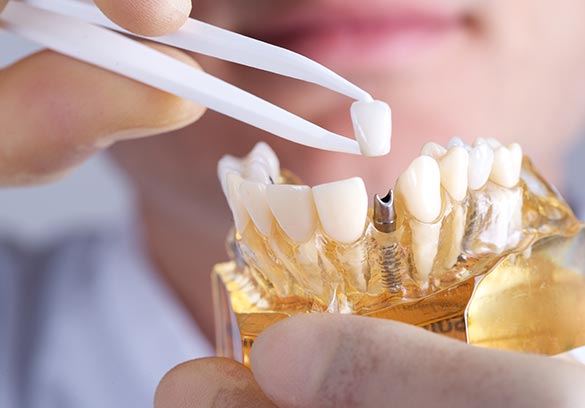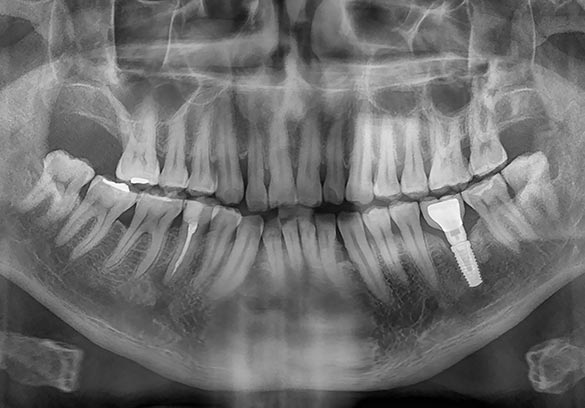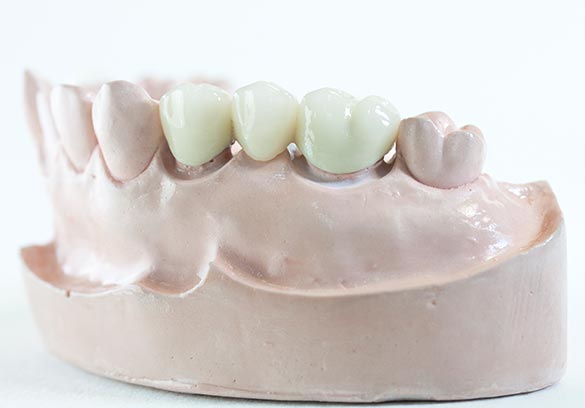Restorative/Implant Dentistry
at Rocheleau Dental
It's time to smile again.
Sometimes teeth need extra care beyond a routine cleaning. Whether you’re showing early signs of a cavity or living with an ongoing dental problem, we’ll work with you to create a treatment plan to manage diseases and restore your oral health, leaving you with a smile you can be proud of.
If you have any questions about our restorative dentistry or other services, contact us today! We'd love to hear from you.

Dentures & Partial Implants
With today’s technology, dentures look more natural and feel more comfortable than ever before. Dentures are a cost-effective solution to tooth loss and gum disease.
Partials
If one or more teeth are missing, a partial denture can fill in the gaps. Unlike a bridge, a partial can replace teeth that are not adjacent to one another, and the device is removable. Most partials attach to neighboring teeth with clasps to limit the movement of your existing natural teeth and distribute chewing forces evenly across the surface of all teeth.
Full Dentures
When all or almost all natural teeth are gone, full dentures replace one or both arches of teeth.
Fixed Dentures
Depending on the location of your missing teeth, your denture may be more effective with the placement of dental implants as anchors. By mimicking the root-and-crown structure of a natural tooth, implants will ensure a more lifelike fit to your denture and prevent slippage or looseness when chewing food.


Bridges
All of your teeth are important for eating, speaking, maintaining the shape of your face, and smiling with confidence. If tooth loss ever occurs, it’s important to replace that tooth to maintain the daily functions of the rest of your teeth. It’s possible to restore your original smile with a dental bridge, a custom-made prosthetic that literally bridges the gaps left between your natural teeth. Bridges are anchored to one or more teeth, called abutment teeth, for stabilization.
There are different types of bridges that can be used depending on the location of the missing tooth.
Traditional Bridge
A bridge used when there are two abutment teeth on either side of the gap.
Maryland Bonded/Resin-Bonded Bridge
A bridge with extended “wings” that extend from the replacement tooth and are bonded to the abutment teeth. teeth for bonding with light buffing and shaping the surface to allow for the placement of the veneer. The permanent veneers should be ready about two or three weeks later.

Inlay & Onlay Restorations
When more than half of a tooth’s biting surface is damaged, an inlay or onlay can bring the tooth back to its original shape and strength. These pieces are made of natural-colored porcelain or composite resin that blend seamlessly with the rest of the tooth when they are bonded to the damaged area. An inlay, similar to a filling, is bonded inside the cusp tips of the tooth. An onlay is a similar restoration that extends to one or more cusps of the tooth.
Inlays and onlays typically require two appointments. The first visit prepares the tooth by removing the decayed or damaged area of the tooth, then applying a temporary sealant. In the following appointment, this sealant is removed, and the inlay or onlay is fitted. The inlay or onlay is then bonded to the tooth with a resin and polished to a smooth finish.
Fillings & Crowns
Cavities are unpleasant, but they almost always get worse when left untreated. With regular checkups, we can detect cavities early enough to prevent the worst complications.
Instead of mercury amalgam fillings that stand out from tooth enamel, we use a composite resin that blends in naturally, restores much of the tooth’s original strength, and is less sensitive to heat and cold than traditional silver (amalgam) fillings.
Sometimes a filling isn’t enough to repair a damaged tooth. If a tooth is decayed or fractured beyond repair, or if old fillings have weakened, a crown may be the best option for restoring the tooth’s durability. A crown encases the entire tooth surface, protecting the tooth structure and restoring it to its original size and shape.
A crown procedure typically requires two appointments. The first appointment covers the preparatory steps: the dentist creates highly accurate molds of the tooth, removes decay, and then fits the tooth with a temporary crown made of metal or plastic. Afterwards, a crown is constructed in a dental lab.
The second appointment is scheduled two weeks later. This procedure involves the removal of the temporary crown, a thorough cleaning of the tooth, and the final placement of your new permanent crown.
There are different material options for the crown...
Porcelain
Because of the translucent quality to the material, porcelain is the most lifelike option for crowns, blending seamlessly with the surrounding tooth for a more natural appearance. Porcelain is resistant to staining, and crowns made from this material can last up to 15 years.
Milled Zirconia
This highly durable ceramic has become an increasingly popular material for crowns in recent years. Although zirconia is more opaque than porcelain, it is extremely durable and strong. Because zirconia can be shaped (“milled”) in the office, crowns made with this material can often be made and delivered in one appointment.
Root Canal Therapy
A root canal doesn’t have to be scary. In fact, it’s a straightforward procedure that saves a tooth with a severe infection. Our cutting edge technology ensures that the treatment is comfortable and doesn’t require more than one or two visits.
When a fracture or a cavity goes untreated, it becomes easier for bacteria to bypass the surface of the tooth and infect the inner pulp. Because the tooth’s pulp contains its nerve, an internal infection can cause a serious toothache and temperature sensitivity.
If this infection is detected early enough, it’s possible to save the infected tooth with root canal therapy. This procedure involves removing the injured pulp, replacing it with manmade material, cleaning and sealing the root canal, and crowning the tooth.
Full Mouth Restoration
When dental damage or decay gets serious, it’s not just your smile that suffers. Damaged or missing teeth can be incredibly painful, and they can make daily functions like eating and speaking a lot more difficult. However, it’s possible to restore your oral health with a combination of cosmetic and functional repairs that will help you smile with confidence again.
Full mouth restoration is a combination of restorative dentistry treatments that is tailored specifically to your unique needs. After a comprehensive consultation that assesses the condition of your teeth and gums, we can craft a personalized plan.

We offer the following treatment options
✓ Bridges
✓ Crowns
✓ Dental Implants
✓ Dentures
✓ Periodontal Treatment
✓ Veneers

